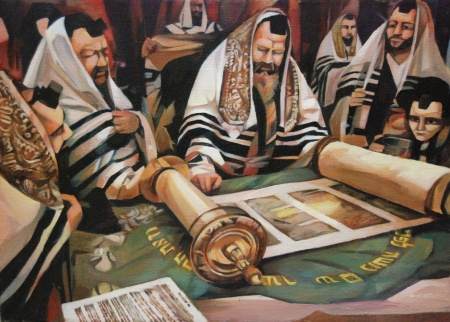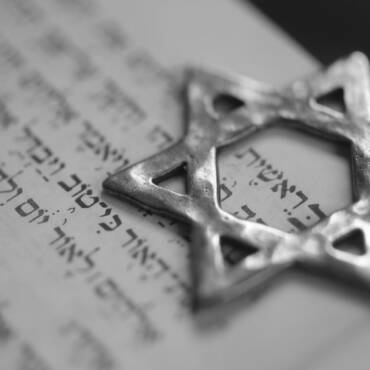Torah & Faith in Messiah Part 2

Last month we looked at how the New Covenant believers in Yeshua are to live with respect to the Torah, or Law of Moses. We learned that at one time we were in effect “married” to the Law, and under its jurisdiction. We then discussed certain aspects of Torah’s authority that are now nullified. In Romans 7:2,6 Paul uses the Greek word katargeo to describe a marriage relationship that ends with death of a spouse. In this passage katargeo is translated released. Paul goes on to say that in Messiah we died to the Law that we might be joined, or spiritually ‘married’ to Yeshua (Rom. 7:4). Thus, we are ‘released’ from the Law’s authority and under the authority of our new Husband, Messiah!
The Law’s Glory Nullified
In 2 Cor. 3:4-14, we see Paul’s midrash (comments and teaching) on exodus 34:29-35, where he again uses the word katargeo. In verses 7 and 8, Paul says that the Torah/Law came with a certain glory, or splendor, but that this glory had limitations: “But if the ministry of death, in letters engraved on stones, came with glory, so that the sons of Israel could not look intently at the face of Moses because of the glory of his face, fading as it was, how will the ministry of the Spirit fail to be even more with glory?” Here, Paul says that the glory Moses received in the Law was “fading away” (katargeo), but the New Covenant glory exceeds and surpasses the fading glory of the Law.
The New Covenant’s Glory is to remain
Condemnation, the very result of the Law, demonstrated the limited glory that could be obtained by the Law: “For if the ministry of condemnation has glory, much more does the ministry of righteousness abound in glory. For indeed what had glory, in this case has no glory because of the glory that surpasses it. For if that which fades away was with glory, much more that which remains is in glory” (2 Cor. 3:9-11). Therefore, the Torah’s glory was to “fade away” (be nullified), but the New Covenant’s glory is to remain.
The Light Shines in Darkness
Considering the surpassing glory that we have in the New Covenant, we are to be bold in our ministry. Unlike Moses who had to hide his fading glory, we proclaim the truth openly ‘without veils’: “Therefore having such a hope, we use great boldness in our speech, and are not like Moses, who used to put a veil over his face so that the sons of Israel would not look intently at the end of what was fading away” (2 Cor. 3:12,13). At first Moses wore the veil in order to prevent those around him from being blinded by God’s glory (see Ex. 34:29-35), but as time passed the veil hid the fact that the glory Moses had received when God gave him the Torah was fading away. This glory began to fade as soon as Moses left the Lord’s presence.
Toward Mature Faith
Please note that the one replaces the other. Those trying to gain honor, glory, or self-confidence through keeping the Law are not enjoying the greater glory we find in Messiah. They soon find that the Law’s fading glory merely reveals where they fall short of the glory of God (Rom. 3:23). But if we look to Yeshua and receive His cleansing and assurance of salvation, we can live open and honest lives, ‘without veils.’ We do not gain our glory, honor, and sense of self-worth from the Law, but through the ministry of righteousness by the spirit from the finished work of Messiah: He is “the LORD our Righteousness.” In Messiah we have the certainty of His glory, even as we have liberty regarding the Law’s authority. We therefore can develop a second principle from this section:
Mature faith does not glory in the Law of Moses, but has confidence in Messiah’s New Covenant
Our boast is in Yeshua alone (1 Cor. 1:30,31).
The Law’s Hostility is Nullified by Faith
As we think of what our faith has brought to us, we cannot overlook the final application of the word katargeo in Eph. 2:14-16…”For He Himself is our peace, who made both groups into one and broke down the barrier of the dividing wall, by abolishing in His flesh the enmity, which is the Law of commandments contained in ordinances, so that in Himself He might make the two into one new man, thus establishing peace, and might reconcile them both in one body to God through the cross, by it having put to death the enmity.”
Jewish and Gentile Believers are made One in Messiah
Outside the Temple courts in Jerusalem there was a partition wall called the Soreg. This was a barrier that restricted access for ‘heathens,’ or Gentiles, when approaching the Temple area, and it contained an inscription forbidding a Gentile from going beyond it on pain of death (see Talmud, [Middoth 2:3; Yoma 16a]; Josephus, Ant. VIII 3, 2, Wars, v. 5,2). In Acts 21:28-31 Paul was falsely accused of taking Trophimus (a Gentile believer) beyond the Soreg. Because of this ‘enmity’, or hostility, a riot ensued.
The Soreg, which symbolized the enmity, existed to maintain the purity of God’s worship and Law from defiling pagan elements. The Law instructed Israel to despise the sinful practices of paganism and directed them to live in such a way that they would be separate in lifestyle and beliefs from the nations and their pagan, sinful customs (Lev. 26:30). However, once Yeshua died for sins, the cause of enmity was no longer there: the enmity had been “abolished” (katargeo). Thus, the Soreg is no longer needed, for Jewish and Gentile believers are made one in Messiah.
Three Principles for those of Mature Faith
From this section we see that the enmity produced by the Law is nullified regarding believers. We therefore can develop our third principle:
Mature faith does not segregate or exclude other believers based on the Law but establishes unity with all believers in Messiah
There are no second-class believers in Yeshua. Since we have been accepted by grace, we are to accept one another with grace as well.
To summarize, the Law’s authority, glory and enmity for believers are in fact nullified, and we see three principles from these truths for those of mature faith:
- Mature faith does not submit to the Torah (Law) but enjoys liberty by submitting to Messiah. We are not Lawless, but we are under the authority of the Messianic ‘Torah’, Messiah Yeshua! (Matt. 11:28,29; 1 Cor. 9: 20,21).
- Mature faith does not glory in Torah but has confidence in Messiah. Our boast is in Him alone (1 Cor. 1:30, 31).
- Mature faith does not segregate by the Torah but establishes unity with all believers in Messiah (Rom. 15:7).
Therefore, let us accept one another as Yeshua has accepted each of us, and keep growing in faith which not only establishes the Law, but also enjoys the liberty, certainty and unity provided graciously in our Messiah. Shalom!




Add Comment